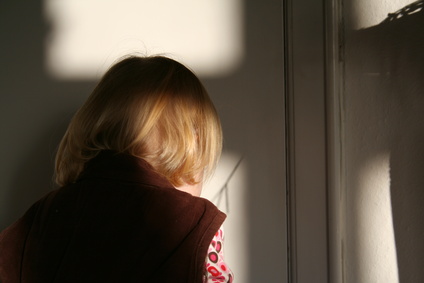When I interviewed Eve Pell, who chronicles late-in-life marriages, including her own, in Love, Again: The Wisdom of Unexpected Romance, I, as usual, researched her life so I didn’t have to ask her questions I already could get answers to. In my research, I discovered her socialite mother cheated on her father, ran off with a lover, married him and had a custody battle that was sordidly played out in New York newspapers. 
So Eve ended up living with the man who effectively destroyed her known family life, a situation I would consider to be one of the worst-case divorces. Except, it wasn’t; Eve loved her stepfather much more than her dad.
But that often isn’t the case. A friend never quite forgave her mother for having an affair and then forcing her to live with her and her lover, whom she also married. And she believes it screwed her up for a long time when it came to her own romantic relationships.
I can imagine she’s not the only one.
It’s hard to know how many kids have been in the middle of a parent’s infidelity because we just don’t know how many people are cheating; estimates are from around 25 percent to as high as 70 percent. And, it’s hard to know how many cheating spouses take their kids with them if they go on to live with or marry their lover. I’m guessing it would be mostly women who would do that; women seek divorce much more than men do, fewer women don’t have custody (2.4 million out of 8.6 million single moms, but that’s approaching the number of single dads, 2.6 million) and they seem to face less public scrutiny or at least less outrage than cheating men do. There are about 1 million kids who experience parental divorce each year, and I’m pretty certain infidelity played a part in a big percentage of those splits; it’s among the top factors for divorce.
And, we aren’t even sure how to define infidelity — Watching porn? Masturbation? Sexting? We are ill-equipped to define infidelity (outside of intercourse) and therapists are, too; that’s why every couple must decide between themselves what’s OK and what’s not.
So it’s no surprise that many, like my friend, go on to have problems with trust and honesty.
“I’m not saying that everyone does it, but 55 percent of adult children that came from families where one parent was unfaithful ended up being cheaters themselves,” says clinical psychologist Ana Nogales, author of Parents Who Cheat: How Children and Adults are Affected When Their Parents Are Unfaithful.
But there are a number of factors to consider — when the kids find out, how old the kids are, whether it’s one isolated incident or a history of sexual shenanigans, whether it leads to divorce, whether the cheating parent moves in with the lover, whether the child becomes a confidante, how their parents handle themselves after, whether the child discovers the infidelity accidentally (like after DNA testing that indicate the man they believe is their father isn’t, which occurs a small percentage of the time). The list goes on and on.
There just isn’t enough long-term data to make generalizations on how a parent’s transgressions impact a child as he or she enters adulthood. But, there are patterns, just as we see in children whose parents are addicts or abusive. “It’s not just a behavior, it’s a whole dynamic of relationships,” says Azmaira Maker, a family therapy psychologist.
And it begins to impact them before the actual infidelity is exposed, says psychiatrist and author Scott Haltzman:
“The unfaithful spouse is mistaken to believe the pain inflicted by the affair happens at the moment the child is told. No, the harm done to the child occurs at the moment that that partner elected to go outside the marriage for an emotional or physical relationship. When an affair happens, it cheats the spouse and the family of the love and commitment of a partner and parent. Telling the child may put an ugly name on why a parent has pulled away from the family, but it is, ultimately, naming a truth. And if there is one thing that affairs teach us, it is how devastating lies can be.”
With that in mind, Haltzman doesn’t agree that children should always be told about a parent’s infidelity. (Which is yet again another reason why all infidelity is not abuse; most of us would agree that children should be immediately removed from an abusive home.)
My kids, 9 and 12 at the time we divorced, knew an age-appropriate amount; I was unsure if they should know, but their father shared that with them and so there you go. Because there was forgiveness — yep, that matters if you ever want to move on — and because we co-parented well with 50-50 physical custody, it hasn’t been an issue as far as I know. I’m sure they will have more questions about it later in life, if they marry and have kids, which is when the Pandora’s box of our family-of-origin issues opens wide.
I imagine few of us have had a perfect, idyllic childhood; most of us are on a spectrum from pretty great to horrible. A parent’s infidelities is just one of the many things life can toss at us. Please share your story.
Download an eBook of The New I Do: Reshaping Marriage for Skeptics, Realists and Rebels for $1.99 through March 15. Details here.
Interested in learning about ways to re-create your marriage? Read The New I Do: Reshaping Marriage for Skeptics, Realists and Rebels (Seal Press). Order the book on Amazon, follow us on Twitter and like us on Facebook.
















